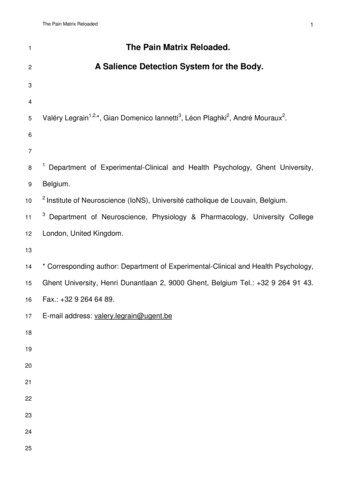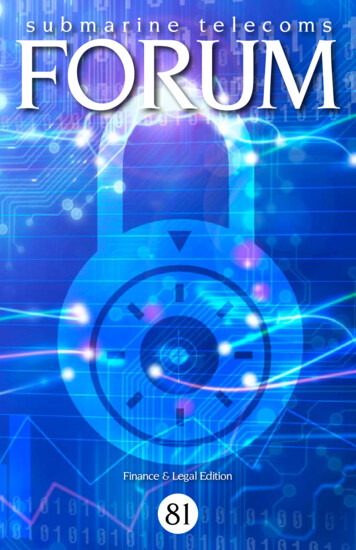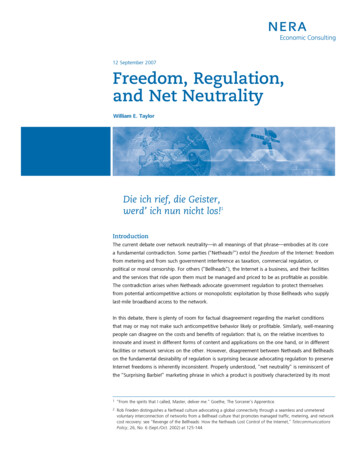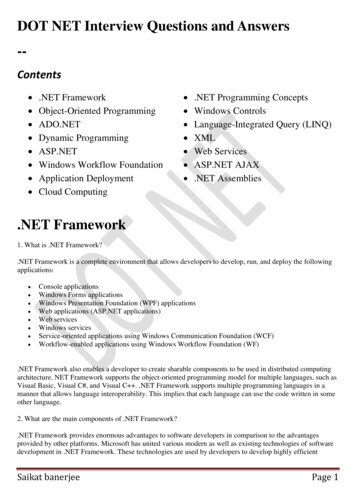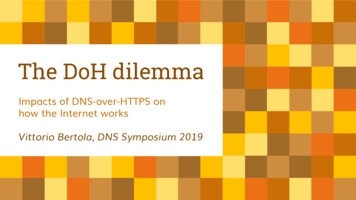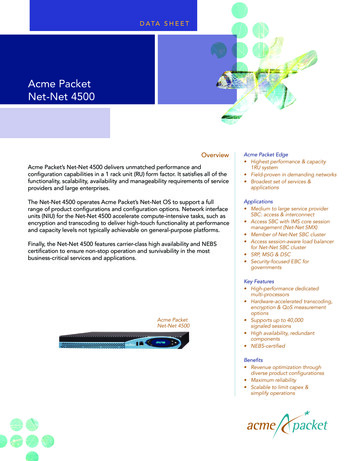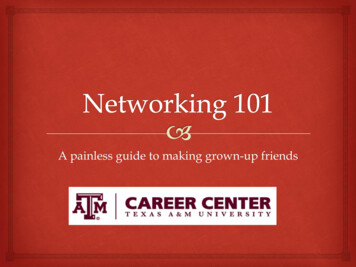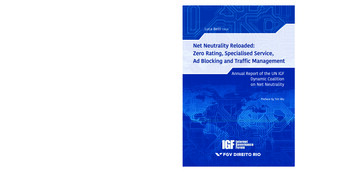
Transcription
Luca Belli EditorNet Neutrality Reloaded:Zero Rating, Specialised Service,Ad Blocking and Traffic ManagementNet Neutrality Reloaded: Zero Rating, SpecialisedService, Ad Blocking and Traffic ManagementAnnual Report of the UN IGF Dynamic Coalition on Net NeutralityLuca Belli EditorIn 2016, Zero Rating was by large the most debated net neutrality issue,as reflected by the considerable number of contributions focusing on thetopic within this report. Such high number of analyses on zero rating seemsparticularly useful to meet the increasing demand of research exploring thepros and cons of price discrimination practices. Furthermore, the reportexamines other very relevant and discussed topics, such as specialisedservices, ad blocking and reasonable traffic management, providing usefulinsight on some of the most recent policy evolutions in a variety of countries.Capa FECHADA orelha.indd 1Net Neutrality Reloaded: Zero Rating, SpecialisedService, Ad Blocking and Traffic ManagementThis Report is the 2016 outcome of the IGF Dynamic Coalition on NetworkNeutrality (DCNN). The Report gathers a series of case studies on a varietyof net neutrality issues from the perspective of different stakeholders. Thedouble purpose of this report is to trigger meaningful discussion on netneutrality trends, while providing informative material that may be used byresearchers, policy-makers and civil society alike. Researchers, practitionersand policy-makers regularly contribute to the DCNN report, providing awide range of heterogeneous views.Annual Report of the UN IGFDynamic Coalitionon Net NeutralityPreface by Tim Wu11/29/16 11:20 AM
Net Neutrality Reloaded: Zero Rating,Specialised Service, Ad Blockingand Traffic ManagementAnnual Report of the UN IGF Dynamic Coalitionon Net Neutrality
Edition produced by FGV Direito RioPraia de Botafogo, 190 13th floorRio de Janeiro RJ Brasil Zip code: 22250-90055 (21) 3799-5445www.fgv.br/direitorio
Net Neutrality Reloaded: Zero Rating, SpecialisedService, Ad Blocking and Traffic ManagementAnnual Report of the UN IGF Dynamic Coalitionon Net NeutralityEdited by Luca BelliPreface by Tim Wu
FGV Direito Rio EditionLicensed in Creative CommonsAttribution — NonCommercial — NoDerivsPrinted in Brazil1st edition finalized in 2016, DecemberThis book was approved by the Editorial Board of FGV Direito Rio,and is in the Legal Deposit Division of the National Library.The opinions expressed in this work are the responsibility of theauthors.Coordination: Rodrigo Vianna, Sérgio França e Thaís MesquitaBook cover: Andreza MoreiraLayout: Andreza MoreiraReviewer: Luca BelliFicha catalográfica elaborada pela Biblioteca Mario Henrique Simonsen/FGVNet Neutrality reloaded : Zero Rating, specialised service, ad blocking and trafficmanagement. Annaul report of the UN IGF Dynamic Coalition on Net Neutrality /Edited by Luca Belli ; preface by Tim Wu. – Rio de Janeiro : FGV Direito Rio, 2016.227 p.Includes bilbliography.ISBN: 97885632657601. Net Neutrality. 2. Internet - Public Policy. 3. Internet - Regulation.I. Belli, Luca. II. Internet Governance Forum. III. Dynamic Coalition on Network Neutrality.IV. Escola de Direito do Rio de Janeiro da Fundação Getulio Vargas. V. Title: NetNeutrality reloaded : Zero Rating, specialised service, ad blocking and trafficmanagement. Annual report of the UN IGF Dynamic Coalition on Net Neutrality.CDD – 384.3The Dynamic Coalition on Network Neutrality (DCNN) is a componentof the United Nations Internet Governance Forum and all interestedindividuals can submit papers to be included in the annual Report ofthe DCNN.For further information: www.networkneutrality.info
CONTENTPREFACE: by Tim Wu.6INTRODUCTION: The Evolutions of the Net Neutrality Debate. 15PART I: Zero Rating Policy. 22Zero Rating: From Generative Internet to Mobile Minitel?Luca Belli. 23Better Regulation of Net Neutrality: A Critical Analysis ofZero Rating Implementation in India, the United Statesand the European UnionChristopher T. Marsden. 52Zero Rating and the Holy Grail: Universal Standards forNet NeutralityArturo J. Carrillo. 86PART II: Zero Rating Pros and Cons. 105Zero Rating: a Global Threat to the Open InternetGustaf Björksten, Raman Jit Singh Chima and Estelle Massé. 106The Economics of Zero RatingJeffrey Eisenach. 117Mobile Zero Rating: The Economics and InnovationBehind Free DataDoug Brake. 132The Politics of Algorithms and Net Neutrality in theZero Rating DebateTomiwa Ilori. 155PART III: Net Neutrality Exceptions and Violations. 164European Net Neutrality at the Beginning of a New EraFrode Sørensen. 165Users’ Rights, Ad Blocking and Net NeutralityRoslyn Layton. 183Mexican ISP Practices Contrary to the Network Neutrality principleunder the New Telecommunications LegislationCarlos Brito. 214
6PREFACEby Tim WuThe philosophy of Net Neutrality (NN) — that an open Internet isa necessary condition for innovation and for consumer welfare —has become intuitive to many. Yet, adoption of NN as a workingpolicy was delayed as parties debated what NN should look like inpractice. In 2016, we witnessed several countries adopt a hard stanceand prohibit certain behaviors now widely recognized as blatantlyabusive. As such, NN became the legal rule in several nationsworldwide.The very fact that NN was confirmed as law of the land in the U.S. — theplace where the Internet was born — is testament to the advancementof Internet policy. For years, the Federal Communications Commission(FCC) acknowledged that the profit-seeking behavior of broadbandservices, when left unchecked, could impose a cost on web users,as well as diminish the innovative character of the internet. The FCCaccordingly proposed a set of legal rules — otherwise known as theOpen Internet Order — that would presumptively outlaw practicesinconsistent with NN: degradation schemes (such as blocking andthrottling access to content) and paid “fast lane” prioritization.As might be expected, broadband providers challenged theseregulations as interfering with efforts to recapture network costs andwarned that it would have an inhibiting effect on future investmentsin internet infrastructure.In due course, the FCC invoked its full authority and reclassifiedbroadband services as a public utility — a move that would givethe FCC ancillary jurisdiction to compel ISPs to adhere to the OpenInternet Order. Indeed, FCC’s rationale was simple: the internet, likethe telephone, had become an essential communications platformfor its users and thus subject to government scrutiny. The U.S. Courtof Appeals for the D.C. Circuit agreed with this line of reasoningand granted the FCC with requisite authority to design bright linerules for outlawing practices wholly inconsistent with NN — namelynetwork degradation and paid prioritization.Indeed, the U.S. was not the only democratic nation that adopteda hardline stance in instituting NN as a working principle. The Bodyof European Regulators for Electronic Communications issued finalguidelines, which effectively closed several loopholes that wouldhave, for example, allowed for “fast” lane arrangements in the E.U.
7India similarly sided with NN and banned ISPs from offering pricingdifferentials for web services. In short, democratic institutionsworldwide were outlawing behaviors clearly in contravention of anopen Internet — an acceptance of NN as the norm.That we see democratic nations tending towards NN should comeas a surprise to few. First, NN should be understood as form of nondiscrimination: it “gives users the right to use non-harmful networkattachments or applications, and gives innovators the correspondingfreedom to supply them.” (Wu 2003). A neutral network wouldensure that developers of online applications succeed based on thequality of their product, and not merely by how much money they canimmediately put forth. Put differently, NN, as a non-discriminatoryregime, is indispensable for promoting technological innovationthrough fair competition in the secondary application market.Second, the non-discriminatory character of NN is consistent withvalues of free expression and an open society. Indeed, a neutralnetwork enables the free flow of information; it is “a necessarycondition for exercising freedom of expression on the Internet ”(OAS 2014). For this reason, the very language in Article 19 ofthe International Covenant on Civil and Political Rights seems tocodify the non-discriminatory tenet of NN: “[t]here should be nodiscrimination in the treatment of Internet data and traffic, basedon the device, content, author, origin and/or destination of thecontent, service or application” (Joint Declaration 2011).At this juncture, it is clear that network degradation and paidprioritization, because they discriminate against certain content,are inconsistent with a NN regime; thus, by banning such practices,democratic governments have demonstrated a commitment topreserving NN as a legal norm. Yet difficult questions have persistedin the debate about NN — for example, is it a violation of NN whena network provider offers certain content in a preferential mannerthrough practices, such as “Zero Rating” (ZR)? To put it differently,if broadband providers are prohibited from hindering user access tocertain content, then does the negative inference also hold? Shouldbroadband providers be prohibited from encouraging user accessto certain content?Indeed, the topic of ZR should be approached cautiously. On theone hand, ZR is a mechanism that can increase overall welfare:users, in certain instances, have greater network access at no costwhile broadband providers have the liberty to improve its quality ofservice. Unlike network degradation and paid prioritization, ZR does
8not deter users from accessing content and preserves a competitivemarket for content. Some have even heralded ZR as a potentialremedy to the current digital divide by increasing internet accessto underserved communities. Altogether, proponents believe thatthe positive effects, as it relates to innovation and user welfare, arereason enough for limiting government regulation in this area.On the other hand, ZR can have the effect of distorting the secondarymarket and in fact, often functions as an end-run around NN norms.In many ways, ZR is similar to paid prioritization. First, ZR creates abifurcated system in which users are incentivized to use certain formsof content over others and thus creates an unleveled playing field.Second, ZR tends to favor incumbent content providers, or those whohave more resources, because the content provider typically must meetcertain standards in order to be zero-rated. Third, ZR may keep certainemerging forms of expression at the fringe. Altogether, it is not difficultto imagine instances in which ZR can distort the content provider marketand reduce both innovation and opportunities for greater expression,which is why many skeptics have urged application of per se illegality.Perhaps at present, it is difficult to conclude whether ZR will alwaysbe irreconcilable with the principles of NN. In fact, many democraticinstitutions that have embraced NN have yet to decide whether ZRshould similarly be presumptively banned. Thus, while it is clear that NNhas, for the most part, become the legal norm, we yet to fully explorehow the full range of practices should be regulated. The writing setforth in this report illuminates the type of issues and perspectives thatcan be found in the ZR debate and serves as the type of discoursenecessary for further evaluation of NN as a working principle.REFERENCESOAS. (2014). OAS Special Rapporteur on Freedom of Expression.Freedom of Expression and the Internet. CIDH/RELE/INF.11/13.Retrieved from s/2014 04 08 Internet ENG%20 WEB.pdf.U.N. Special Rapporteur on Freedom of Opinion & Expression,OSCE Representative on Freedom of the Media, OAS SpecialRapporteur on Freedom of Expression, & ACHPR SpecialRapporteur on Freedom of Expression & Access to Information(2011). Joint Declaration on Freedom of Expression on theInternet. Retrieved from http://www.osce.org/fom/78309.Wu, T. (2003). Network neutrality, broadband discrimination. Journalof Telecommunications and High Technology Law, 2.
9AcknowledgementsThis book reflects many of the ideas discussed by the members ofthe Dynamic Coalition on Network Neutrality (DCNN) of the UnitedNations Internet Governance Forum, between 2015 and 2016. Theeditor would like to express gratitude to all the DCNN members fortheir precious inputs.Furthermore, the editor would like to thank the Fundação GetulioVargas Law School, which has provided support and guidance,stimulating this research effort.
10About the authorsLuca Belli is Senior Researcher at the Center for Technology andSociety (CTS) of Fundação Getulio Vargas Law School, Rio de Janeiro,where he leads the ‘Internet Governance @ FGV’ project. Dr Belli is alsoassociated researcher at the Centre de Droit Public Comparé of Paris 2University. Before joining CTS, he worked as an agent for the Councilof Europe Internet Governance Unit; served as a Network NeutralityExpert for the Council of Europe; worked as a consultant for the InternetSociety and as a Ph.D. researcher at Université Panthéon Assas (Paris2). Dr Belli is also the founder and co-chair of the Dynamic Coalition onNetwork Neutrality of the United Nations Internet Governance Forum,as well as the co-founder and co-chair of the IGF Dynamic Coalitionon Community Connectivity and the Dynamic Coalition on PlatformResponsibility. His works on Net Neutrality have been i.a. quoted by theReport on Freedom of expression and the Internet of the OAS SpecialRapporteur for Freedom of Expression and used by the Council ofEurope in order to elaborate the Recommendation of the Committeeof Ministers on Network Neutrality. Amongst other publications, hehas recently authored De la gouvernance à la régulation de l’Internet,edited by Berger-Levrault, Paris, and co-authored the Net NeutralityCompendium, edited by Springer.Gustaf Björksten is Chief Technologist at Access Now. Gustaf has beengaining professional experience as a technologist and informationsecurity specialist since 1994, most recently in the area of surveillancetechnology. He has worked in many different ICT environments andreckons he has seen just about everything. He has worked for dot comstartups, led from the front during the internet boom, and endured thedot com bust. He has worked for small companies, rapidly growingcompanies, and very large corporations in the computer games,education, ISP, pharmaceutical, telecoms, and financial sectors. From2001-2005 he founded and ran a hackerspace in Melbourne, Australiathat housed over 150 computers of every size, description and platform.Doug Brake is a telecommunications policy analyst at ITIF. Hespecializes in broadband policy, wireless enforcement, and spectrum- sharing mechanisms. He previously served as a research assistantat the Silicon Flatirons Center at the University of Colorado. Brakeholds a law degree from the University of Colorado Law Schooland a bachelor’s degree in English literature and philosophy fromMacalester College.
11Carlos Brito is a human rights defender. He has a degree onJournalism and Media at the Monterrey Institute of Technology andHigher Education where he is a professor of digital rights. He is a Ph.D. candidate on science and technology studies at the Center forResearch and Advanced Studies (CINVESTAV). Brito is an activist inmatters of democracy, freedom of expression (particularly Internetfreedom and right to protest), privacy and access to information.He is Advocacy Director at R3D (Digital Rights Defense Network)based at Mexico City.Arturo J. Carrillo is Clinical Professor of Law and Director of theInternational Human Rights Clinic at The George WashingtonUniversity Law School. Professor Carrillo co-directs GW LawSchool’s Global Internet Freedom and Human Rights Project, andsits on the Board of the Global Network Initiative as an academicrepresentative. Before joining the faculty at GW in 2003, ProfessorCarrillo served as the acting director of the Human Rights Clinicat Columbia Law School, where he was also Lecturer in Law andthe Henkin Senior Fellow with Columbia’s Human Rights Institute.Prior to entering the academy, he worked as a legal advisor onhuman rights for the United Nations, as well as for prominentnon-governmental organizations in his native Colombia. ProfessorCarrillo’s current research, writing and advocacy revolve around theintersection of ICTs and human rights, focusing on the promotionand defense of Internet freedom principles worldwide. His recentpublications examine Net Neutrality issues from the perspective ofinternational law.Jeffrey Eisenach is a Managing Director and Co-Chair of NERA’sCommunications, Media, and Internet Practice. He is also anAdjunct Professor at George Mason University Law School, wherehe teaches Regulated Industries, and a Visiting Scholar at theAmerican Enterprise Institute, where he directs the Center forInternet, Communications, and Technology Policy. Previously, Dr.Eisenach has served in senior policy positions at the US FederalTrade Commission and the White House Office of Managementand Budget, and on the faculties of Harvard University’s KennedySchool of Government and Virginia Polytechnic Institute andState University. Dr. Eisenach’s consulting practice focuses oneconomic analysis of competition, regulatory, and consumerprotection issues. He has submitted expert reports and testifiedin US federal court as well before the Federal Communications
12Commission, the Federal Trade Commission, several state publicutility commissions, and courts and regulatory bodies in Australia,Canada, the Caribbean, and South America. He has written or edited19 books and monographs, including Broadband Competitionin the Internet Ecosystem and Competition, Innovation and theMicrosoft Monopoly: Antitrust in the Digital Marketplace.Tomiwa Ilori works for Paradigm Initiative Nigeria as theProgram Assistant (ICT Policy). He works on projects that furtherconversations on digital rights and Internet freedom acrossAfrica and also develops research papers, policy briefs andrecommendations on ICT Policy roadmaps. He has keen interestsin the discourse of rights-respecting technologies and how Africaand other underserved regions are affectedRaman Jit Singh Chima is Policy Director at Access Now, leadingthe organisation’s team of global policy staff in protecting an openinternet and advancing the rights of users at risk across the world. Heis a founding volunteer with the SaveTheInternet.in Net NeutralityCoalition and assisted the legal team involved in the Supreme Courtof India’s landmark Shreya Singhal v. Union of India judgment oninternet free speech. Prior to this, he served as Policy Counsel andGovernment Affairs Manager with Google based in Delhi across2010-2014 and advised government, industry bodies and academiaon technology policy issues. He is an India qualified lawyer enrolledwith the Bar Council of Delhi and clerked for Justice V.S. Sirpurkarof the Supreme Court of India.Roslyn Layton is a PhD Fellow in internet economics and policy atthe Center for Communication, Media, and Information Technologies(CMI) at Aalborg University in Copenhagen, Denmark. She is a partof Denmark’s Industrial Ph.D. program, an initiative of the Ministryof Science, Innovation and Higher Education to support research ofboth academic and commercial value and to facilitate knowledgetransfer between Denmark and the rest of the world. To improvethe quality of internet policymaking, her research project assessesthe impact of Net Neutrality rules to innovation and investmentin 50 countries using empirical methods of traffic analysis fromdata science and software analytics. Layton has a backgroundin the IT industry, having worked for Coremetrics IBM in SiliconValley and Tata Consultancy Services Innovation Labs-Hyderabadoffering analytics software and platforms, disruptive technologies,
13outsourcing, healthcare/biotech IT, and IT development services.Her research is hosted at the Doctoral School of Engineering andScience at Aalborg University in Denmark. She earned the OneMBAexecutive MBA degree from University of North Carolina-ChapelHill, Rotterdam School of Management-Netherlands, EGADE inMexico, FGV in Brazil, and the Chinese University of Hong Kong.Christopher T. Marsden is a renowned international expert onInternet and new media law, having researched and taught in thefield for over twenty years. He is Professor of Internet Law at theUniversity of Sussex since 2013. He is author of five monographson Internet law: “Net Neutrality: From Policy to Law to Regulation”(January 2017, Manchester UP), “Regulating Code” (2013, MITPress with Prof. Ian Brown), “Internet Co-regulation” (2011,Cambridge), “Net Neutrality: Towards a Co-Regulatory e”(Routledge/Cavendish 2007). He is the author of the “Oxford Bibliographyof Internet Law” (2012) and chapters on Internet law in severalHandbooks. He is author of many refereed articles, book chapters,professional articles, papers in selected proceedings, keynoteaddresses, and other scholarly contributions. Chris researchesregulation by code - whether legal, software or social code. Chrisis a committed inter-disciplinarian, having published severaljointly written papers, book chapters and articles with economists(Jonathan Cave and Campbell Cowie), computer scientists (IanBrown), and social scientists (Damian Tambini, Stefan Verhulst,Colin Blackman, Christian Ahlert, Simon Forge and others). He wasformerly Professor of Law at Essex (2012-13), having previouslytaught and researched at Essex (2007-12), RAND (2005-7),Oxford (2004-5), Warwick (1997-2000), LSE (1995-1997). He heldVisiting Fellowships at Harvard, Melbourne, Cambridge, Oxford,USC-Annenberg, Keio, GLOCOM Tokyo, and FGV Rio de Janeiro.Estelle Massé is Senior Policy Analyst at Access Now. Her workfocuses on Data Protection, Privacy, Surveillance and Net Neutrality.Prior to joining Access Now, Estelle interned with European DigitalRights (EDRi), an association of 31 privacy and civil rights groupsacross Europe and at the UNESCO in Barcelona. Massé holds aMaster in European Law from the University of Granada, SpainFrode Sørensen is a Senior Adviser at the Norwegian CommunicationsAuthority (Nkom) and he holds a Master of Science degree from
14the University of Oslo. Frode has been leading the developmentof the Norwegian Net Neutrality policy at Nkom since 2007, andhe has been an architect behind the Norwegian guidelines for NetNeutrality published in 2009. He has been Chair of BEREC NetNeutrality Expert Working Group since it was established in 2010.The Working Group developed BEREC’s Net Neutrality guidelineswhich were published August 2016. Sørensen has more than twentyyears of experience in telecommunications and has previouslyworked at Agder University, Telenor and Ericsson and he is theauthor of several books on Internet technology.Tim Wu is an author, policy advocate, and professor at ColumbiaLaw School. Wu’s best known work is the development of NetNeutrality theory, but he also writes about private power, freespeech, copyright and antitrust. His books The Master Switch andThe Attention Merchants have won wide recognition. Wu worked atthe Federal Trade Commission during the first term of the Obamaadministration, and has also worked as Chair of Media reformgroup Free Press, as a fellow at Google, and worked for RiverstoneNetworks in the telecommunications industry. He was a law clerk forJudge Richard Posner and Justice Stephen Breyer. He graduatedfrom McGill University (B.Sc.), and Harvard Law School. He has wonawards from Scientific American magazine, National Law Journal,02138 Magazine, and the World Economic Forum, and has twice wonthe Lowell Thomas Award for travel writing.Net Neutrality Reloaded: Zero Rating, Specialised Service,Ad Blocking and Traffic ManagementAnnual report of the UN IGF Dynamic Coalition on Net Neutrality
15INTRODUCTION1 The Evolutions of the Net Neutrality DebateThe Annual Report of the Dynamic Coalition on Network Neutrality1(DCNN) of the United Nations Internet Governance Forum gathersa series of case studies on a variety of Net Neutrality (NN) issuesfrom the perspective of different stakeholders. The double purposeof this report is to trigger meaningful discussion on NN trends, whileproviding informative material that may be used by researchers,policy-makers and civil society alike. Any interested individual cansubmit papers to be included in the report and submissions areevaluated for their novelty and undertake blind peer-review process.Researchers, practitioners and policy-makers regularly contributeto the DCNN report, providing a wide range of heterogeneousviews on NN trends.In 2016, Zero Rating (ZR) was by large the most debated NN issue,as reflected by the considerable number of contributions focusing onthe topic within the DCNN report. Such high number of ZR-focusedstudies seems particularly useful to meet the increasing demand ofresearch analysing the pros and cons of ZR. Furthermore, the reportanalyses other very important and debated topics, such as specialisedservices, ad blocking and reasonable traffic management, providinguseful insight on some of the most recent policy evolutions and onthe implementation of NN laws in a variety of countries.The report is structured in three sections analysing (i) Zero RatingPolicy; (ii) Zero Rating Pros and Cons; (iii) Net Neutrality Exceptionsand Violations.1.1 Zero Rating PolicyThe first section encompasses three analyses, providing insighton ZR practices, ZR policies as well as the consideration of ZRfrom the perspective of international human rights law. In hiscontribution on “Zero Rating: From Generative Internet to MobileMinitel?” Luca Belli stresses that the ZR debate is the latest chapterof the NN saga. The author argues that although the sponsorshipof applications may seem beneficial to improve access to specific1See http://www.networkneutrality.info/sources.html as well as 1330-dc-on-network-neutrality#stakeholders
16Net Neutrality Reloaded: Zero Rating, Specialised Service,Ad Blocking and Traffic Managementcontent and services, some ZR models may trigger a phenomenondefined by Belli as “Minitelisation of the Internet.” This phenomenonconsists in the Internet’s evolution from a generative and generalpurpose network, where users may freely generate and shareinnovation, into a predefined-purpose network, characterised by acentralised — and easy-to-control — configuration, where passivecustomers merely access predefined applications, as it happened inthe old Minitel network. Belli notes that ZR practices are generallymatched to reduced data caps and mainly implemented withinmobile networks. ZR offerings consist in the sponsorship — by anoperator or a third party — of the data consumption related to alimited set of applications, or class of applications, depending onthe type of ZR. The author provides a taxonomy of ZR practiceswhich is instrumental to stress the existence of various flavours ofZR and to identify which ZR practices conflict with the NN rationaleand may lead to Minitelisation. Several ZR schemes are based onthe provision of unlimited access exclusively to the applicationsapproved by the operator, while billing and capping access to therest of the Internet, in order to orient user experience towards alimited selection of applications. Belli stresses that such practiceshave the potential to restrain Internet openness, fostering acentralised model that characterised less innovative and morecontrolled networks, such as the Minitel. The author argues thatInternet users cannot be deemed as mere consumers but shouldrather be considered as active “prosumers,” for they can bothproduce and consume content and applications and, therefore, c
Service, Ad Blocking and Traffic Management This Report is the 2016 outcome of the IGF Dynamic Coalition on Network Neutrality (DCNN). The Report gathers a series of case studies on a variety . remedy to the current digital divide by increasing internet access to underserved communities. Altogether, proponents believe that



